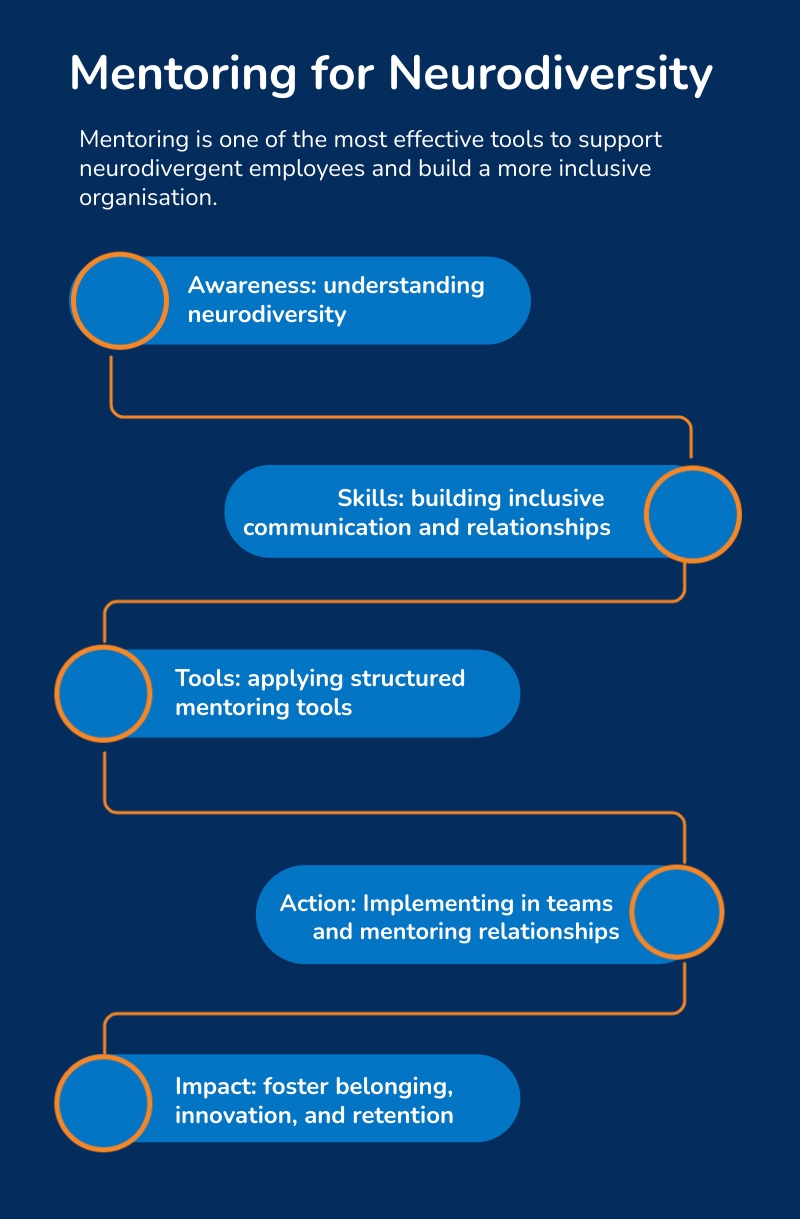Mentoring for Neurodiversity
Neurodiversity is both a reality and a powerful opportunity in today’s workplaces. Research shows that neurodivergent individuals – including those with ADHD, autism, dyslexia, and other cognitive differences – bring valuable perspectives, skills, and problem-solving approaches to the workplace. Yet many face barriers related to communication, social expectations, or lack of tailored support.
Mentoring can be a highly effective way to address these barriers. Structured mentoring initiatives have been shown to improve retention, wellbeing, and career development for neurodivergent employees, while also fostering greater awareness and inclusion across the organisation.
Whether you’re looking to adapt an existing programme or design one from scratch, we’ll help you create a mentoring experience that meets real needs and makes a real difference.

Want to know more about strategic mentoring?
Book a free consultation with one of our consultants
Why Mentoring?
Mentoring is a powerful lever for inclusion which benefits both the neurodivergent staff and the organisation. Mentoring offers a practical and human way to support neurodivergent individuals while building a stronger, more inclusive culture. It can play a key role in creating more inclusive, supportive, and high-performing environments for neurodivergent employees. With the right mentoring approach, organisations can unlock individual strengths, foster belonging, and reduce barriers to development.
Mentoring benefits:
For Neurodivergent Employees
- Increased confident and self-advocacy - Mentoring helps neurodivergent individuals better understand their strengths, communicate their needs, and build self-advocacy skills in navigating workplace dynamics.
- Career development and progression - A mentor provides guidance on career paths, opportunities, and strategies to achieve professional goals — helping address potential barriers to advancement.
- Social connection and reduced isolation - Mentoring offers a supportive relationship that can reduce feelings of isolation, foster belonging, and provide a safe space to share experiences.
- Strategies for navigating workplace challenges - Mentors can share tools and approaches for managing sensory sensitivities, communication differences, executive functioning demands, or other neurodivergence-related challenges.
For organisations
- Improved retention of neurodivergent talent - Providing mentoring support can reduce turnover by making neurodivergent employees feel valued, supported, and better equipped to succeed.
- Enhanced innovation and diversity of thought - Supporting neurodivergent employees through mentoring helps unlock their unique perspectives, contributing to more creative problem-solving and innovation.
- A more inclusive culture - Mentoring programmes signal organisational commitment to inclusion, helping shift culture towards greater acceptance of neurodiversity and reducing stigma.
- Improved manager and colleague understanding - Especially through reciprocal mentoring (where neurodivergent employees and mentors share their strengths and challenges), the programme can increase awareness, empathy, and inclusive practices across the workforce.

Mentoring for Neurodiversity
Mentoring for Neurodiversity helps leaders, mentors, and HR professionals build inclusive environments where neurodivergent talent can thrive. Through tailored mentoring tools, practical strategies, and actionable frameworks, participants gain the confidence and skills to support neurodivergent colleagues while strengthening organisational inclusion.
Why choose this approach?
- Build awareness and practical skills to support neurodivergent employees
- Strengthen inclusive communication and mentoring relationships
- Apply mentoring tools that foster trust, psychological safety, and growth
- Champion neurodiversity as part of your DEI and organisational culture strategy
Supporting neurodiversity in the workplace offers a range of tangible benefits. Organisations with neurodivergent employees often report enhanced creativity and innovation, as unique perspectives contribute to team dynamics and spark groundbreaking ideas and solutions. This diversity of thought fosters both creativity and productivity within teams. In addition, fostering inclusion and providing appropriate accommodations can lead to a stronger organisational culture and environment.
When employees feel valued as individuals, it positively influences behaviours across the organisation, promoting a climate of care, conscientiousness, and mutual encouragement. Inclusive HR policies that embrace diversity can directly shape leadership behaviour and contribute to a supportive and equitable workplace. Furthermore, neurodivergent employees have been shown to be up to 140% more productive than their neurotypical peers, and organisations that actively employ and support neurodivergent talent often outperform competitors – achieving, on average, 28% higher revenue and stronger returns on investment for shareholders.
3 ways to apply the Mentoring for Neurodiversity approach
No two programmes are designed the same way
They must be adapted to the specific purpose, context, and development needs. Below you see three different models for addressing neurodiversity. Each model has a different focus, specific benefits and key elements in matching and training.
Model 1: Mentoring neurodivergent individuals
What it is:
- Pairing neurodivergent employees with trained mentors (neurodivergent or neurotypical, offline mentoring) to support navigation of workplace dynamics.
- Focus on confidence, communication, disclosure decisions, and goal-setting.
- Mentors offer emotional validation and strategic support for work-related challenges.
Key Benefits:
- Increases retention and job satisfaction.
- Reduces isolation and masking-related burnout.
- Empowers self-advocacy and use of accommodations.
- Builds a sense of belonging and psychological safety.
Model 2: Mentoring for neurodiverse leaders
What it is:
- Mentorship for neurodivergent individuals in management or leadership roles.
- Supports authentic leadership styles, energy management, communication, and career growth.
- Can include coaching on navigating neurotypical systems without masking (i.e. hiding your neurodiversity).
Key Benefits:
- Increases representation and confidence in leadership pipelines.
- Reduces burnout by supporting authenticity and self-awareness.
- Fosters role modelling and visibility for other neurodiverse staff.
- Equips leaders to challenge and reshape exclusionary norms.
Model 3: Reverse/Reciprocal mentoring
What it is:
- Structured mentorship where neurodivergent staff share lived experiences and feedback with managers from other teams, and managers in turn share their experiences and perspectives on neurodiversity.
- Aims to shift understanding, attitudes, and leadership practices from the inside out.
Key Benefits:
- Promotes empathy and inclusive leadership behaviours.
- Surfaces barriers that might otherwise remain invisible.
- Builds trust and shared accountability.
- Humanizes DEI beyond compliance checklists.


